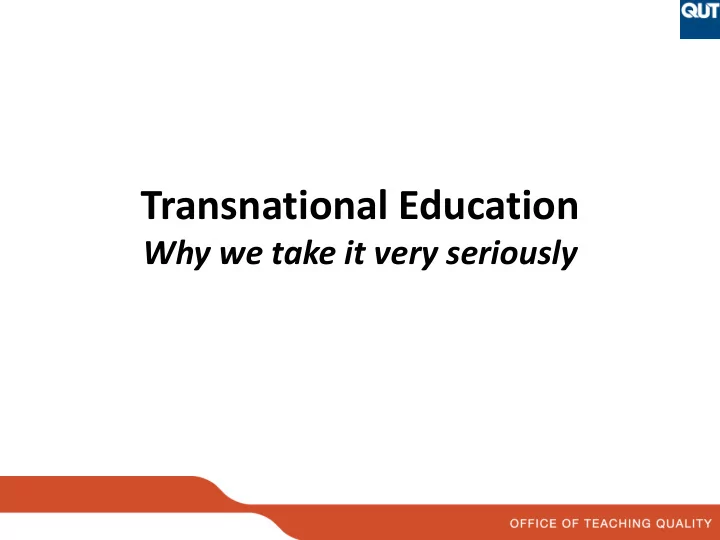

Transnational Education Why we take it very seriously
Agenda • Introduction (Vi) • TNE opportunities, business case & contracts (Colin) • TNE Curriculum Development & Approval (Stephen) • Admitting TNE Students (June, Mary & Colin) • Inducting students (Vi & Stephen ) • Ensuring IT access- library, Blackboard, email (Vi & Stephen) • Staff induction (Vi, Mary, Colin) – demo Education wiki (Mary) – OCS safety briefing docs (Colin) • Equivalence and ongoing course QA requirements (Vi & Stephen) • Ongoing business management- OCS and faculties (Colin & Mary)
Getting started with TNE • Finding TNE opportunities- Who? Where? Why? • Getting up close and personal with viability, costing, business case development, negotiating contracts • Send for OCS! They are the experts and this is not within the duty statement of course coordination!
Curriculum Development and Approval • Include in the Faculty Strategic Plan, a clear position on TNE, and as specific programs arise, in the Strategic Faculty Courses Update • Don’t do anything! (without confirming with your Assistant Dean (Teaching and Learning) first) • Discuss with OCS, OTQ, and more experienced players • TNE isn’t easy. It takes faculty experience, suitable existing course frameworks that can be easily adapted, and robust TNE infrastructure within the faculty.
TNE Course Approval Process Completed SFCU CCP CBB CEL FAB VCAC UAB Proposal Initial Curriculum Designing and Developing Team formed Curriculum Architecture Users post to CBB Users post to CEL Email notification sent to Email notification sent to various Divisional staff appropriate Divisional staff 4 week turnaround Divisions provide formal Divisions engage in endorsement (for forwarding consultation as required to FAB as required)
Admitting and Enrolling Students • Entry requirements including English proficiency • Student IDs • IT access codes • Fee payments • Managing variations from QUT standard systems.
Student orientation & induction • Student rights and responsibilities • Student charter • Grade appeals • Academic honesty • Support services
IT and Library Access • QUT IT systems – Will students have access? How will this be organised? How will support be provided locally? – If no access, what are the alternatives? • Library resources – Are adequate resources available locally/ online? – Do students have access to library databases? If no access, what are the alternatives? • Learning Management System (Blackboard) – Will students have access? How will this be organised? How will support be provided locally? – If no access, what are the alternatives? • Evidence of equivalence in learning environment?
Staff induction • Understanding the course- learning outcomes, and teaching approaches • How particular units fit in the curriculum • Logistics & safety briefings • Cultural matters • Communication- staff to staff; staff to students • Moderation approaches • PPr reviews for local staff • QUT Code of conduct
Equivalence of Learning Environment How will you be assuring equivalence of learning environment for the students (in comparison to a standard QUT offering)? Eg.: o assuring comparable entry standards o Ensuring local academic staff qualifications are comparable to QUT staff o monitoring student experiences using comparable practices and instruments to those used in the parent course (LEX, ICRs). o reviewing teaching practices (through site visits, regular meetings of team, targeted professional development programs) o ensuring availability of comparable resources (eg. library, Bb sites, texts, other learning resources) o independent audits of TNE program. o Comparing adequacy of physical learning spaces- labs, studios, classrooms
Equivalence of Learning Outcomes How will you be assuring equivalence of learning outcomes/academic standards (in comparison to a standard QUT offering)? Eg. : o Note content may be customized for particular locations but quality and rigor need to be equivalent to regular offering o ICRs, LEX, governance reports within faculty o using internal and external moderation approaches o independent audits by external reviewers o Comparing student achievement levels on equivalent capstone learning outcomes assessments o systematic feedback from significant stakeholders (employers, local accreditation agencies)
TNE Audit Cycle • TNE award programs are subject to deep internal audit every four years • Next one is due in 2012 … but • AUQA/TEQSA coming in 2011. Count on them auditing every TNE program in existence at that time. This is a high stakes area for the Australian Government!
Staying healthy in TNE: Ongoing business management • Making a profit for the long term • Enhancing reputation • Managing risk • Reviewing deliverables • Reviewing contracts prior to renewal • Exit strategy- ‘teaching out’ Thinking before you leap in and knowing when to get out!
Recommend
More recommend